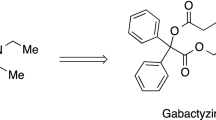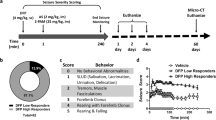Abstract
Organophosphorus nerve agents are still in use today in warfare and as terrorism compounds. Classical emergency treatment of organophosphate poisoning includes the combined administration of a cholinesterase reactivator (an oxime), a muscarinic cholinergic receptor antagonist (atropine) and a benzodiazepine anticonvulsant (diazepam). However, recent experiments with primates have demonstrated that such treatment, even when administered immediately after organophosphate exposure, does not rapidly restore normal electroencephalographic (EEG) activity and fails to totally prevent neuronal brain damage. The objective of this study was to evaluate, in a realistic setting, the therapeutic benefit of administration of GK-11 (gacyclidine), an antiglutamatergic compound, as a complement to the available emergency therapy against organophosphate poisoning. GK-11 was injected at a dose of 0.1 mg/kg (i.v) after a 45-min latency period to heavily intoxicated (8 LD50) primates. Just after intoxication, man-equivalent doses of one autoinjector containing atropine/pralidoxime/diazepam were administered. The effects of GK-11 were examined on survival, EEG activity, signs of toxicity, recovery after challenge and central nervous system histology. The present data demonstrate that treatment with GK-11 prevents the mortality observed after early administration of classical emergency medication alone. EEG recordings and clinical observations also revealed that GK-11 prevented soman-induced seizures and motor convulsions. EEG analysis within the classical frequency bands (beta, theta, alpha, delta) demonstrated that central activity was totally restored to normal after GK-11 treatment, but remained profoundly altered in animals receiving atropine/pralidoxime/diazepam alone. GK-11 also markedly accelerated clinical recovery of soman-challenged primates. Lastly, this drug totally prevented the neuropathology observed 3 weeks after soman exposure in animals treated with classical emergency treatment alone. GK-11 represents a promising adjuvant therapy to the currently available emergency polymedication to ensure optimal management of organophosphate poisoning in man. This drug is presently being evaluated in a human clinical trial for a different neuroprotective indication.
Similar content being viewed by others
Author information
Authors and Affiliations
Additional information
Received: 16 June 1997 / Accepted: 23 September 1997
Rights and permissions
About this article
Cite this article
Lallement, G., Clarençon, D., Masqueliez, C. et al. Nerve agent poisoning in primates: antilethal, anti-epileptic and neuroprotective effects of GK-11. Arch Toxicol 72, 84–92 (1997). https://doi.org/10.1007/s002040050472
Issue Date:
DOI: https://doi.org/10.1007/s002040050472




